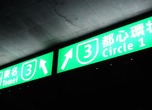
Posted: Mon Apr 19 2010
Later this year, Nissan’s electric car, the Nissan Leaf, will go on sale. The Leaf is a zero emission, environmentally friendly car that is, instead of gasoline, powered by an internal lithium battery.
‘Zero emission’ is a phrase that gets thrown about on a daily basis, and for those who are still scratching their heads at what is really means, it refers to a system that is built to produce no exhaust. The net result is a car that doesn’t churn out carbon dioxide while being driven.
To help the general public gain a greater understanding of this concept, Nissan has unveiled its Journey to Zero website, made under the direction of François Bancon, General Manager of Nissan’s Marketing and Communication Group, Global Zero Emissions Business Unit and Product Strategy and Product Planning Division.
Bancon’s impressive career is also eclectic. After studying mathematics and engineering in Bordeaux, Bancon received a degree in fine art and art history at a school for fine arts in Paris. He worked as a freelance graphic designer, advertising guru and media consultant before joining Renault, then Nissan, where he has been working since 1999.
Bancon explains that Journey to Zero is ‘…not a website about cars; it’s about a lifestyle. Rather than trying to encourage consumerism, we are seeking to appeal to people’s intelligence. We want them to value learning, discovering and being inspired by various things. We want them to understand what taking place. Our company also needs for consumers to change.’
The website was made under the supervision of TED Conference creator and information design expert, Richard Saul Wurman. This collaboration between architects, designers and artists can help to bring about an understanding of, and response to zero emission – and help to bring about action.
So what is the difference between conventional cars that run on gasoline and electric cars? According to Bancon, ‘Electric cars create a new relationship between people and their car. From the appearance, it looks just like a regular car, but the inner workings are completely different. While we were aiming for a niche market with the appearance, we wanted to make a mass-produced car that a lot of people would want to drive. We made it based on our current car concept, which is to make cars that people all over the world can use in their daily lives. While it has purposely been made to look like a typical gasoline-run car, the electric car is in a league of its own.’
Charging the car’s cell is at the forefront of people’s reservations about electric cars. On that point, Bancon says there’s little cause for worry, pointing out, ‘It has been shown that in Japan that even with a full battery, the distances people travel in their regular trips is quite short. In Europe, there is a lot of travel between countries, but in Japan the average distance people drive in one day is 35 kilometres. When fully charged, the Nissan Leaf can travel 160 km, so recharging is not an issue.’
Refuelling doesn’t seem to pose any problems, but they would still need to be mass-produced. Another point that comes up is that in recent years there has been a profound shift away from cars by the younger generation. How Nissan addresses these kinds of issues will affect the success of the car. Bancon muses, ‘There are a lot of young people in Tokyo who are of the “digital generation”. Because an electric car has IT elements to it, we think that this can be a way for us to connect with young people. We want the “iCar” to have the same image an iPhone. Another thing is the electric car can go as fast as a Skyline and is as much fun as a GT-R.’
The iPhone has surpassed the concept of being a mobile phone by bringing a new value to the lives of consumers. Likewise, the electric car provides a new value that is non-existent in gasoline-run cars, while fully incorporating their appeal. The way Bancon sees things, because electric cars have been built around digital technology, they are perfect match for young people.
Whether the electric car will really provide a solution to young people’s shift away from cars is yet to be seen. However, the electric car world Bancon describes at least provides us with a different way for our car society to be. If electric cars catch on, there is no doubt that the world in which we live will change and it will also prompt a change in the relationship between people and cars. There is a strong possibility that in the future, young people will really be into this new vehicle that looks like a car, is good to the environment and makes for fun driving.
There is also talk of plans to have express charging stations designed as part of towns. At these stations, people can charge electrical gadgets such as mobile phones and computers, and get something to drink or get the latest entertainment news, all while their car is being charged.
Electric cars and zero emission mobility will provide our lives with a completely new experience for our lives. No doubt there will be changes in the way our society lives – it will be interesting to follow Nissan’s efforts and find out how they help affect the change.
Tweets
- About Us |
- Work for Time Out |
- Send us info |
- Advertising |
- Mobile edition |
- Terms & Conditions |
- Privacy policy |
- Contact Us
Copyright © 2014 Time Out Tokyo













Add your comment